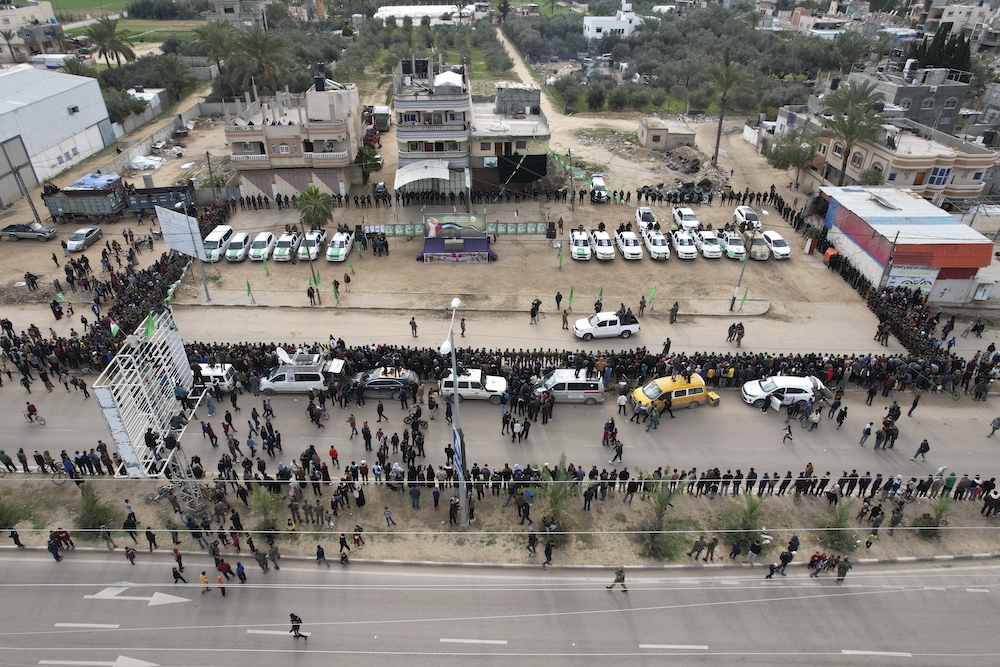NEW YORK CITY: The Gulf Cooperation Council on Wednesday stressed the need to respect the independence and territorial integrity of Syria, reject foreign interference, combat terrorism and respect the country’s religious and cultural diversity as it embarks on a new chapter of its history after the fall of long-time dictator Bashar Assad.
Speaking on behalf of the GCC, Kuwait’s permanent representative to the UN, Tareq Albanai, expressed its support for a comprehensive and inclusive political process, moves toward national reconciliation, and efforts to rebuild the state.
He called for national unity and comprehensive dialogue, adding that the “stability of Syria is the cornerstone for stability in region.”
Albanai was speaking at the Security Council’s first meeting of the year on Syria. He told members that the GCC decided to participate in the meeting only “to confirm our determination to help the country politically, economically, developmentally and humanitarianly.”
GCC member states categorically reject the repeated attacks on Syria by Israeli occupation forces and call for their immediate withdrawal from Syrian territories, he added.
“We renew our firm position that the Golan is Syrian territory and condemn the expansion of Israeli settlements in the occupied Golan,” Albanai said.
He also called for the lifting of the economic sanctions imposed on Syria during the civil war.
Egypt’s permanent representative to the UN, Osama Abdel Khalek, speaking on behalf of the UN Arab Group, also condemned the ongoing Israeli occupation of the Golan Heights, and what he described as “Israel’s opportunistic exploitation of the current situation to occupy further Syrian territories, bomb cities and infrastructure.”
He urged the Security Council to intervene and put an end to the Israeli “aggression, occupation” and “the illegal presence of all foreign forces in Syria.”
Syria’s permanent representative to the UN, Kusay Aldahak, told the council that caretaker authorities in the country are willing to build “friendly relations with all UN member states based on cooperation and shared interests and away from the policies of polarization.”
He added that the “new Syria is willing to play a positive role in the international arena. It will promote international and regional peace and security, and will not engage in any conflict or war.”
Aldahak called on the UN to “immediately and fully lift the unilateral coercive measures; provide necessary financing to meet needs and recover basic services, mainly electricity; support livelihood projects and sustainable development; reconstruct damaged service facilities; ensure de-mining; rid Syria of the remnants of war; and allow dignified refugees to return to their cities and homes.”
The UN’s humanitarian chief, Tom Fletcher, told council members that close to 13 million Syrians face acute food insecurity at a time when the World Food Programme has been forced to reduce the amount of food assistance it provides by 80 per cent in the past two years as a result of funding shortfalls.
More than 620,000 Syrians remain displaced as a result of the operation to remove Assad in November and December, on top of the 7 million who had already been displaced by more than a
decade of civil war. In the northwest of the country alone, 2 million people are living in camps, Fletcher said.
US ambassador Dorothy Shea said the transition process and the Syrian government that emerges from it must ensure any chemical weapons that remain in the former Assad regime’s stockpiles are secured and destroyed.
“We are encouraged by the cooperation to date and call for the continued commitment of relevant actors in Syria to work with the Organization for the Prohibition of Chemical Weapons, the United Nations, and other state and non-state partners to chart a course for the complete and verifiable elimination of any remaining elements of a chemical weapons program, and assist released detainees and the families of those whose whereabouts remain unknown,” she said.
Shea also urged the interim government to deter individual acts of vengeance, and to partner with international institutions to identify ways to ensure that those guilty of war crimes and crimes against humanity are held accountable.
Shea said the US welcomes “positive messages from Hayat Tahrir Al-Sham but will ultimately look for progress in actions, not words. We are looking for actions and words that will explore policies that prioritize the well-being of the Syrian people.”
The UN’s special envoy for Syria, Geir Pedersen, said he stands ready to work with the caretaker authorities “on how the nascent and important ideas and steps so far articulated and initiated could be developed towards a credible and inclusive political transition.”
The UK’s permanent representative to the UN, Barbara Woodward, said she was encouraged by the timelines set by the interim authorities for drafting a new constitution and holding elections and a national dialogue, and by their early engagement with the international community.
She called for their continued cooperation with UN as she welcomed the caretaker government’s efforts “to secure the chemical weapons stock and work with OPCW to fully declare and verify the destruction of such weapons. Now is the moment to close the Syria chemical weapons file once and for all.”
Russian ambassador Vassily Nebenzia said: “Syria has more than enough problems and their severity should in no case be underestimated.”
He warned of the “fairly high risk of intensification of hostilities” in many parts of the country, in particular Aleppo and Quneitra. He also highlighted “the direct threat to the territorial integrity of Syria” arising from “the unlawful actions of Israel, which is carrying out a policy of fait accompli in the occupied Golan Heights, and 500 square kilometers of Syrian land have already been seized.”
Nebenzia blamed sanctions imposed by the US “and its satellites” for exacerbating the humanitarian crisis in the country. As result of these sanctions, the Syrian economy is “under extreme pressure and is not able to cope with the challenges facing the country,” he added.






























